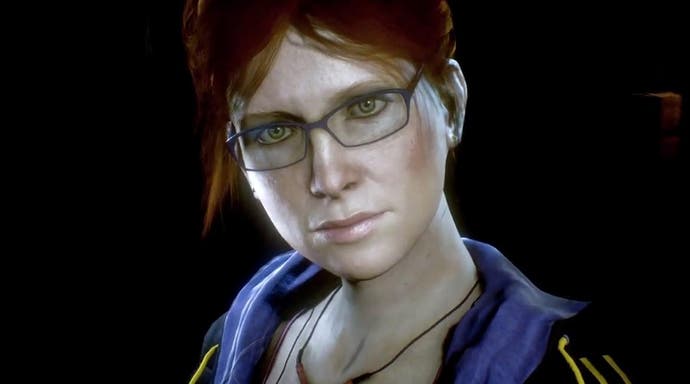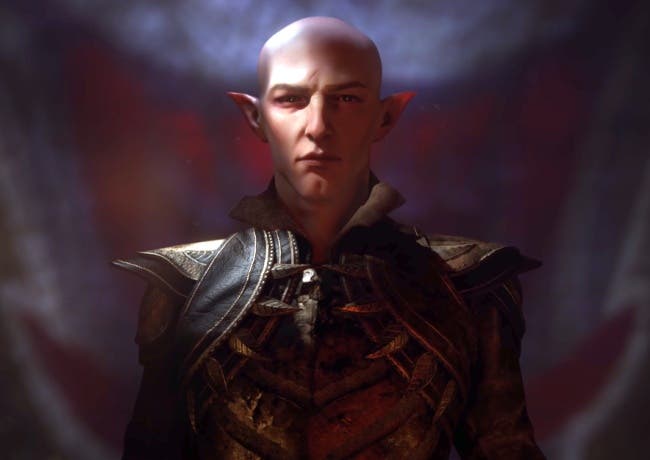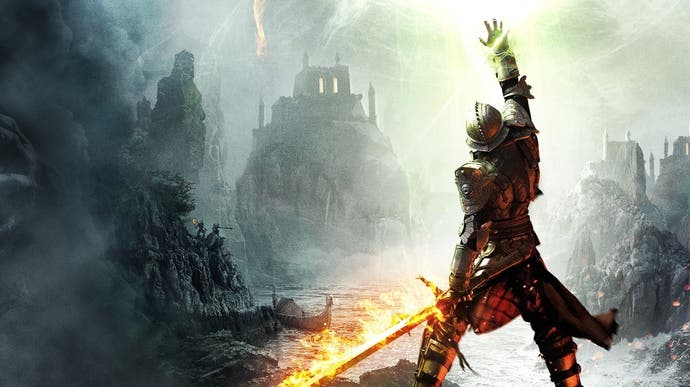BioWare is wrong, Dragon Age doesn't need to replace its disabled protagonist
The Inquisitor's full story is not yet told.
This piece contains major spoilers for the Dragon Age series, particularly Inquisition.
"It's time for a new hero..."
Those are the first words spoken by recurring Dragon Age companion Varric Tethras after the BioWare logo disappears in the most recent trailer for the new Dragon Age game trailer. But Varric and BioWare are wrong, Dragon Age doesn't need a new hero; the Inquisitor's story has not yet been fully told, and they offer BioWare the chance to give gaming exactly the sort of character it needs: a powerful, disabled protagonist.
Disability in mainstream gaming is rare. There's Geralt in The Witcher series, who suffers from chronic pain after shattering his elbow and thigh bone, and for AAA protagonists, that's pretty much it. Given that both the gaming and TV adaptations play down this chronic disability, many players don't even realise Geralt is canonically disabled, or will actively argue against it. Once you bring in the supporting cast, you can add the likes of Joker in Mass Effect and Barbara Gordon in the Batman: Arkham series, but now we're already starting to run out of examples.

Those meagre offerings, plus gaming's bad habit of using physical disabilities as a signifier of or motivation for villainy, highlights the poor job gaming has done to make the disabled community feel welcome in the space. Advancements in accessibility for disabled gamers have rightly been lauded, but representation is stuck at a standstill.
This isn't just a random "hey, wouldn't it be cool if the Dragon Age 4 protagonist was disabled," thought. The Inquisitor is already disabled, and casting them aside not only avoids making a bold step for representation in the industry, it reinforces Dragon Age's worst storytelling tendencies too.
Let's start with a refresher on the Inquisitor. At the beginning of Dragon Age: Inquisition, we start (for the third time in as many games) as a new, able bodied character. After an explosion, they receive a magical mark on their hand, which allows them to close rift portals in the sky. Across the 80-100 hour playthrough, they go from Jackie Nobody From Nowheresville to the Inquisitor, one of the most powerful political players in all of Thedas. Lots of other things happen too, but most of them come either through the Inquisitor's magical rift abilities, or through their prowess in battle.
However, in the very last scene of Dragon Age: Inquisition's final DLC (Trespasser), the magic mark becomes too powerful, and the Inquisitor loses their arm. In a single instant, their two greatest strengths (rift abilities and combat skills) are snatched away from them. And BioWare thinks this moment, right as the character faces their biggest obstacle, is an appropriate stopping point for their story?!
While the Inquisitor might disagree on a physical level, I don't think on a thematic level that our hero has lost all that much here. In fact, I think they've gained. 'A nobody who becomes a somebody after being given special powers' is not a unique or particularly interesting angle for a story. What the Inquisitor was in Dragon Age: Inquisition has been done before, many times. But the potential story for Dragon Age 4 can be something new. The Inquisitor has not been reset to zero here. Their wisdom, their courage, their leadership, their wit, their morality... all of this survived the amputation. They have not been reset to scratch as punishment or penitence. Dragon Age 4 would not be about them starting over after hardship - itself a tried and told story - but would be about them adapting to this change, both as a ruler without their rift magic and a fighter without an arm. It could be about how disabled people matter, how they're more than their disabilities. How disabled people are not less than able bodied people. Instead, BioWare is replacing them with an able bodied person.
What BioWare is doing is like Game Of Thrones putting Jaime Lannister on a horse after he lost his hand, watching him ride off then never showing him again. Then two episodes later, Jaime's long lost brother Raime Lannister shows up to take his place. But in Game Of Thrones, Jaime's hand is cut off by minor tertiary character Locke. For the Inquisitor, it was much more intimate.
Solas is the one who ultimately removes your hand in Inquisition. Depending on how you play the game, Solas can be a rival, colleague, friend, closest ally, or even your romantic partner, each of which tinge the scene with a different significance. This isn't just out of the goodness of his heart though; Solas is actually responsible for the rift marking your hand in the first place. He is an old elven God in disguise, he unleashed Dragon Age: Inquisition's main antagonist, he once betrayed his fellow gods, and he has spent the entirety of the game's runtime betraying you.
With Solas confirmed to return as Dragon Age 4's main antagonist, BioWare clearly believes there's a lot more of this story to explore.
At the end of Trespasser, the Inquisitor learns of this betrayal, but still trusts Solas one last time to take the rift mark from their hand, and as a result, lose their arm. It may be that the arm, badly injured by this point, was too far gone to save, but with Solas' story likely to be on examining how much of his betrayal of the Gods was actually malicious and how much of it was the result of an action taken for the greater good, there are clear thematic links. How much does the Inquisitor accept that Solas had no choice? How much do they, a hero known for their prowess in battle, resent that Solas cost them their arm, and had been lying about his intentions all along? Does it make them bitter? More resolute? Reflective and forgiving?

Sadly, we won't get to know any of this, because BioWare is going to replace the Inquisitor with a new hero and ask us to imbue them with our own feelings about Solas, in support of what's shaping up to be a generic 'go stop the bad guy' narrative.
I realise the Inquisitor will probably return in some form; they're too important to Solas' arc not to. Much like Hawke, the Dragon Age II protagonist who returns for a brief time in Inquisition, their links to Varric will probably give them a foot in the door, but if they're important enough to bring back, why not do it right? Especially for a series which frequently fails to tie up loose ends?
I know there are logistical issues, but frankly I don't think they're worth getting into. Yes, with the possible exception of Mage, all other classes typically require two hands. My answer to that is... so what?
Just because disabled people require certain concessions does not mean they should be denied access before anyone has even given these concessions a try. We've seen this in the real world, with disabled campaigners trying for years to get a greater shift towards offices working from home, only for the pandemic to trigger this shift overnight to aid able bodied workers.
You're telling me there's no prosthetic, no weaponry adaptation, that can be created to allow a legendary fighter such as the Inquisitor to effectively use a sword with one hand? Or a dagger? In a world of magical dragons, I don't even think a ranged contraption is out of the question. We've already seen tabletop games integrate wooden wheelchairs into Dungeons & Dragons; if you want to accommodate disabled characters, there's always a solution. The problem is, it doesn't seem like too many people want to.
Dragon Age 4, which sees Solas shift from companion to antagonist, is shaping up to be the closest the series has had to a true sequel. In the Inquisitor, they have a compelling, intimately linked protagonist whose story is not over, ready to return in the leading role. Replacing them is a wasted opportunity thematically, narratively, and robs gaming of the disabled representation it sorely needs.


